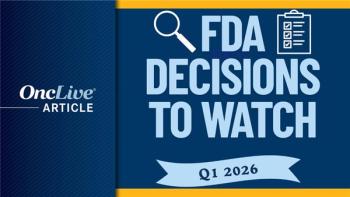
FDA Approves Pembrolizumab for TMB-High Tumors
The FDA has approved pembrolizumab (Keytruda) to treat adult and pediatric patients with unresectable or metastatic solid tumors that are tissue tumor mutational burden–high (≥10 mutations/megabase) and have progressed following prior therapy and who have no satisfactory alternative treatment options.
The FDA has approved pembrolizumab (Keytruda) to treat adult and pediatric patients with unresectable or metastatic solid tumors that are tissue tumor mutational burden (TMB)–high (≥10 mutations/megabase) and have progressed following prior therapy and who have no satisfactory alternative treatment options.1
The FDA has also approved the FoundationOneCDx assay, deveoped by Foundation Medicine, as a companion diagnostic for pembrolizumab.
The approval is based in part on data from a prospectively planned, retrospective analysis of 10 cohorts of patients with several previously treated, unresectable or metastatic, TMB-high solid tumors who were enrolled on the phase 2 KEYNOTE-158 trial. In this trial, a link was established between TMB-high status and improved overall response rate (ORR) with the PD-1 inhibitor in patients with various solid tumors.
The multicenter, multicohort, nonrandomized, open-label trial accrued patients with anal, biliary, cervical, endometrial, salivary, thyroid, or vulvar carcinoma, mesothelioma, a neuroendocrine tumor, or small cell lung cancer. Patients had to have an ECOG performance status of 0 or 1 and have progressed on or be intolerant to at least 1 prior line of standard treatment. The investigators used the FoundationOne CDx assay to assess TMB in FFPE tumor samples, with 10 Mut/Mb used as the threshold for TMB-high status.
Pembrolizumab was administered intravenously at 200 mg every 3 weeks for 35 cycles or until progressive disease, unacceptable toxicity, or physician/patient choice. The main efficacy outcome measures included ORR and duration of response (DOR) in patients who had received at least 1 dose of pembrolizumab as evaluated by blinded independent central review in accordance with RECIST v1.1 criteria, which were modified to follow a maximum of 10 target lesions and a maximum of 5 target lesions per organ. The key secondary outcome measures progression-free survival (PFS), overall survival (OS), and safety.
Overall, there were 755 patients with evaluable TMB, 102 (13%) of whom had tumors that were classified as TMB-high. Results showed that the ORR with pembrolizumab in these patients was 29% (95% CI, 21-39), which was comprised of a 4% complete response rate and a 25% partial response rate. The median DOR had not been reached; more than half, or 57%, of patients experienced response durations of ≥12 months and half (50%) of patients had response durations of ≥24 months.
Previously reported data showed that the median PFS for the
With regard to safety, adverse events (AEs) between those with TMB-high tumors who were enrolled on the trial were found to be comparable to those occurring in patients with other solid tumors who had received the PD-1 inhibitor. The most commonly reported AEs included fatigue, musculoskeletal pain, decreased appetite, pruritis, diarrhea, nausea, rash, pyrexia, cough, dyspnea, constipation, pain, and abdominal pain. The agent is also associated with immune-related AEs, such as pneumonitis, colitis, hepatitis, endocrinopathies, nephritis, and adverse skin reactions.
Additionally, prescribing information for the agent includes a “Limitation of Use” in that the safety and effectiveness of the drug in pediatric patients with TMB-high central nervous system cancers have not yet been established.
Data from the KEYNOTE-158 trial previously supported pembrolizumab’s initial tumor-agnostic approval.3 In May 2017, pembrolizumab was approved for the treatment of adult and pediatric patients with unresectable or metastatic, MSI-H or mismatch repair deficient (dMMR) solid tumors that have progressed after prior treatment and who have no satisfactory alternative treatment options, as well as for patients with MSI-H or dMMR colorectal cancer following progression on a fluoropyrimidine, oxaliplatin, and irinotecan.
The approval was based on data from 149 patients with MSI-H or dMMR cancers enrolled across 5 single-arm clinical trials, one of which was KEYNOTE-158. Ninety patients had colorectal cancer (CRC) and the remaining 59 patients had 1 of 14 other tumor types.
The ORR with pembrolizumab was 39.6% (95% CI, 31.7-47.9), including 11 (7.4%) complete responses and 48 (32.2%) partial responses. The ORR was 36% in patients with CRC and 46% in patients with other tumor types. The median duration of response was not yet reached (range, 1.6+ months to 22.7+ months). Among patients who responded to pembrolizumab, 78% had responses that lasted for at least 6 months.
References
- FDA approves pembrolizumab for adults and children with TMB-H solid tumors. News release. FDA. June 16, 2020. Accessed June 16, 2020. bit.ly/3el8pck.
- Marabelle A, Fakih MG, Lopez J, et al. Association of tumour mutational burden with outcomes in patients with select advanced solid tumours treated with pembrolizumab in KEYNOTE-158. Ann Oncol. 2019;30(suppl 5):11920. doi:10.1093/annonc/mdz253.018
- FDA grants accelerated approval to pembrolizumab for first tissue/site agnostic indication. News release. FDA. May 23, 2017. Accessed June 16, 2020. bit.ly/2UV9yzC.



































